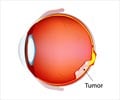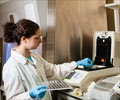
Shweta U. Dhar, M.D., M.S., of Baylor College of Medicine, Houston, Texas, and colleagues describe outcomes associated with a comprehensive approach to provide genetic testing and counseling for patients with retinoblastoma using a multidisciplinary team of pediatric oncologists, ophthalmologists, a geneticist, and genetic counselors. The study included data collected over an eight-year period (January 2001 to December 2008) from patients diagnosed with retinoblastoma at Texas Children's Hospital.
The authors retrospectively evaluated data on 90 cases during the study period; 81 patients who were diagnosed with retinoblastoma, and nine children who were evaluated because of family history of retinoblastoma. Of the 81 patients with retinoblastoma, 34 (42 percent) had bilateral tumors (tumors in both eyes) and 47 (58 percent) had unilateral tumors (tumor in only one eye).
Genetic testing was accomplished in 51 (63 percent) of 81 patients with retinoblastoma using a multidisciplinary approach. Twenty-two patients (65 percent) in the bilateral group and 29 patients (62 percent) in the unilateral group underwent genetic testing. The ability to identify a genetic mutation in the blood sample of patients with bilateral retinoblastoma was 91 percent (20 of 22 patients). Of the 29 patients undergoing genetic testing in the unilateral group, five (17 percent) had a mutation identified in blood samples, documenting a hereditary form of retinoblastoma. In another seven patients (23 percent) mutation analysis confirmed the occurrence of sporadic retinoblastoma.
Overall, genetic testing of 48 at-risk family members from 21 families revealed six individuals positive and 42 negative for the familial mutation of the RB1 gene. Thus, performing genetic testing of retinoblastoma patients followed by testing their at-risk family members may eliminate the need for additional testing in the majority of relatives and identify the few high-risk relatives who need intensive screening.
"Our study emphasizes that genetics can be incorporated into the management plan of all retinoblastoma patients using a team approach to ensure timely evaluations and appropriate counseling. Genetic evaluations improved risk prediction for patients and family members as well as prevented overutilization of clinical screening tests, which had potential morbidity for relatives documented to not carry an RB1 mutation."
Advertisement














